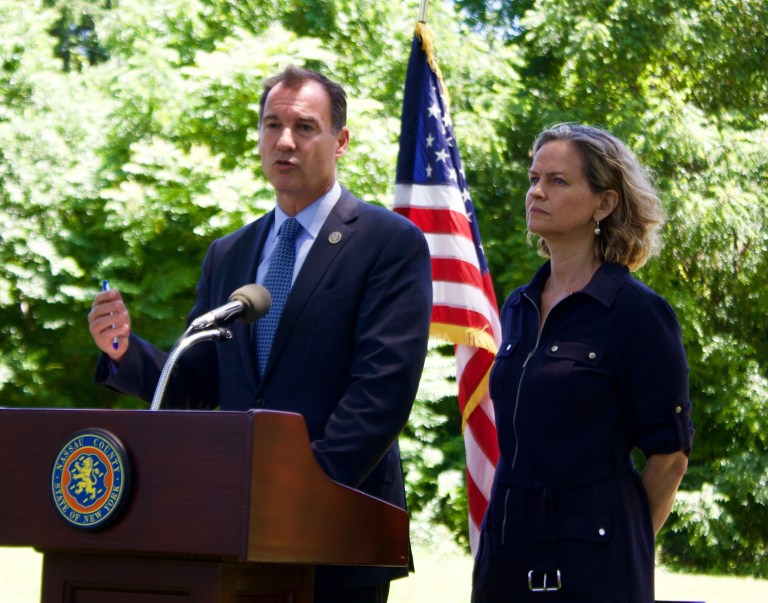
Two more migrant children who were separated from their families at the U.S.-Mexico border have been placed at the MercyFirst home for children in Syosset, bringing the total there to 10.
The numbers were disclosed by U.S. Rep. Tom Suozzi (D-Glen Cove) and Nassau County Executive Laura Curran, who visited the facility and held a news conference on Monday.
One of the biggest concerns, said Curran, is the trauma that the children are experiencing. “The thing that we’re very concerned about these children is the psychological and physical toll of being separated from their families even for a short period,” she said. “The damage can be very hard to overcome.”
Curran said that the children are receiving exceptional care and commended MercyFirst for its service.
“These children are being very well taken care of at MercyFirst. They are getting fed, they are getting the care they need, they are getting education, sports, woodworking, I mean you name it,” said Curran. “They’re getting everything; healthcare, wonderful nutrition.”
Over the weekend, two more children came to the facility, one on Friday and one in the early hours of Monday morning.
The children are from Guatemala, Honduras, Brazil and Nicaragua. There is a 4-year-old, 5-year-old, 6-year-old, two 7-year-olds, a 9-year-old, an 11-year-old, two 14-year-olds and one 17-year-old. The children are half boys and half girls.
The original eight children have spoken to their parents by telephone, Suozzi said, but not the newest two because “they are still being processed.”
Suozzi said that he did not know why the two children arrived over the weekend despite President Donald Trump’s executive order to stop the separation of families when trying to cross the border from Mexico illegally.
“We don’t know the answer as to why that happened,” said Suozzi.
Suozzi said that it is unclear as to when the children will be reunited with their parents. During his visit, he said he was surprised to learn that some of the children have been in the Syosset facility since early May, while some came in June.
Suozzi said that he did not see any obvious signs of distress in the children, and said that the attitudes of the children are as positive as they could be in the circumstances. Although Suozzi said that their interactions with the children were very limited, “We did make a point of saying hello and good luck in rudimentary Spanish,” adding that the children responded kindly.
“This is a very professionally run environment,” said Suozzi about MercyFirst. “They’ve been doing this for a long time, and they’re professionally trained in child welfare issues.”
Last weekend, Suozzi visited the Tornillo detention facility outside El Paso, Texas, with a bipartisan congressional delegation. Many migrant children are being held there after being separated from their parents.
Suozzi said that he was surprised to learn that when people are apprehended when trying to illegally cross the border, they are first brought into the system through a law enforcement procedure.
Every person is then entered into a system and has a tracking number. Suozzi said that his biggest concern is dealing with younger children. “My big concern, is when you’ve got a child that’s 4 years old or younger that’s somewhere in the system. They don’t know their last name, they don’t necessarily know what country they’re from, they might not be able to communicate, and we have to make sure that that child is closely monitored throughout the process and is not mixed up with other kids,” said Suozzi.
Overall, Suozzi said that the Texas facility was well run with air-conditioned tents, a medical facility and recreational facilities, saying that the staff-to-children ratio was good.
“The bottom line is, we’ve got a real problem in this country and it’s been made into an emergency because of poor policy,” said Suozzi. “That poor policy has reversed, but there are still problems that are emerging, and what we really need to do is get together as a country with Democrats and Republicans and start working together to actually address this problem in a comprehensive solution instead of all the finger-pointing and blame game.”
Gretchen Keller can be reached at gretchenkellerr@gmail.com and followed on Twitter at @gretchenkellerr.






